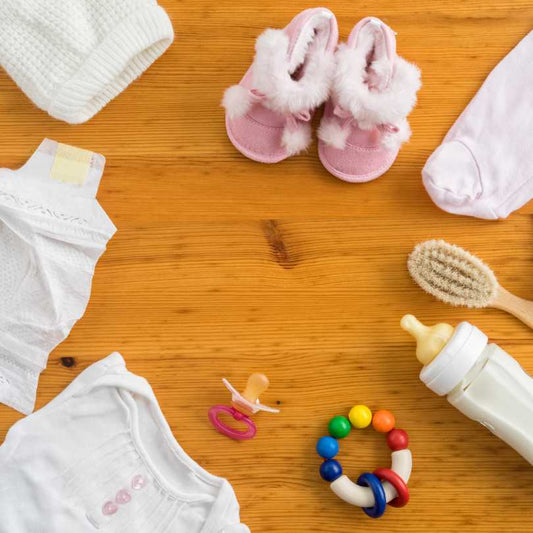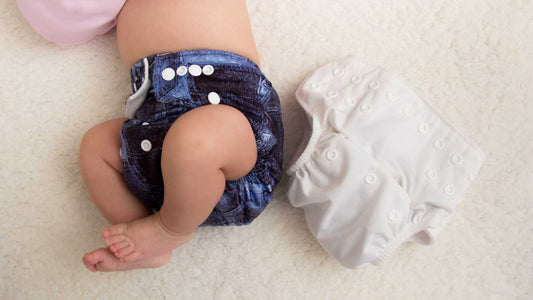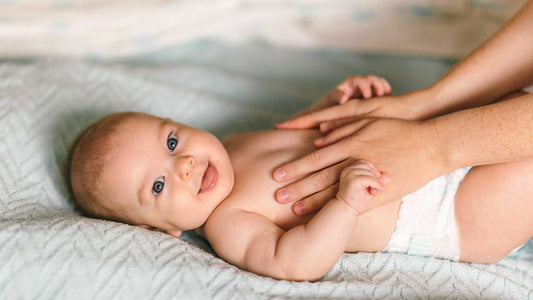
In Germany, there is a growing movement of parents opting for reusable cloth diapers. Cloth diapers have many advantages over disposable diapers, such as z.B. greater environmental friendliness and cost-effectiveness. In this article, we'll cover everything you need to know about reusable cloth diapers.
What are reusable cloth diapers?
Reusable cloth diapers are washable diapers made from fabrics such as cotton, hemp, or bamboo. They can be used over and over again and are a sustainable alternative to disposable diapers.How do they work?
Reusable cloth diapers work similarly to disposable diapers. They consist of an outer layer that is leak-proof, an absorbent layer, and an inner layer that comes into contact with the baby's skin. Once the diaper becomes wet or soiled, it can be easily washed and reused.
What types of cloth diapers are there?
There are different types of reusable cloth diapers, such as z.B.:
Each type of cloth diaper has its own advantages and disadvantages, and it depends on your individual needs which type of diaper is best for you.
How many cloth diapers do I need?
The number of cloth diapers you need depends on the size of your baby and how often you change them. As a rule of thumb, most experts recommend about 24-36 cloth diapers to have in order to have a good supply.
What are the advantages of reusable cloth diapers?
There are many advantages of reusable cloth diapers, such as z.B.:
Environmental friendliness
Compared to disposable diapers, reusable cloth diapers are much more environmentally friendly. Disposable diapers produce tons of waste that can remain in landfills for decades. Reusable cloth diapers significantly reduce the amount of waste and can be reused up to 200 times.
Cost efficiency
Reusable cloth diapers can also be more cost-effective than disposable diapers. Although the initial purchase price is higher, they provide long-term savings because they can be reused and you don't have to constantly buy new diapers.
comfort
Another advantage of reusable cloth diapers is that they are generally more comfortable for babies. Because they are made of soft fabrics, they are gentler on the baby's skin and cause fewer irritations and rashes.
Health benefits
Reusable cloth diapers also have health benefits. Some parents report that their babies are less prone to diaper rash when wearing cloth diapers because they are made of breathable materials and do not contain chemicals.
Better fit
Cloth diapers often fit better than disposable diapers because they can be customized and there are no size restrictions. This can help prevent leaks and accidents.
How do you wash reusable cloth diapers?
Reusable cloth diapers should be washed after each use. Most cloth diapers can be machine washed, but it's important to follow the manufacturer's instructions.Use an appropriate amount of detergent and rinse the diapers thoroughly to ensure all soap residue is removed.
What are the disadvantages of reusable cloth diapers?
Although there are many advantages of reusable cloth diapers, there are also some disadvantages that must be considered.
More work
Reusable cloth diapers require more work than disposable diapers. They need to be washed and dried, and they can also take longer to change.
Higher initial costs
The initial purchase price of reusable cloth diapers is typically higher than that of disposable ones. However, it's important to note that they can be reused, resulting in long-term cost savings.
More difficult on the way
Reusable cloth diapers can be more difficult to use on the go because you don't have the option to wash them. Disposable diapers are more convenient in this regard.
Conclusion
Reusable cloth diapers have many advantages, such as greater environmental friendliness, cost-effectiveness, and health benefits. While there are disadvantages, these can often be offset by the advantages. Whether reusable cloth diapers are the right choice for you and your baby depends on your individual needs.
Frequently asked questions:
Are reusable cloth diapers really more environmentally friendly than disposable diapers?
Yes, reusable cloth diapers are more environmentally friendly because they produce less waste and can be used for longer.
How many cloth diapers do I need?
The number of cloth diapers needed depends on the baby's size and how often they change diapers. Experts generally recommend about 24-36 diapers.
How do you wash reusable cloth diapers?
Reusable cloth diapers should be washed after each use
Use an appropriate amount of detergent and rinse the diapers thoroughly to ensure all soap residue is removed.
Are reusable cloth diapers harder to change than disposable diapers?
No, reusable cloth diapers often have a better fit and can be customized, which can help prevent leaks and accidents.
Can reusable cloth diapers really save money?
Yes, although the initial purchase price may be higher, reusable cloth diapers can save money in the long run because they can be reused and do not require regular purchases of disposable diapers.
What types of reusable cloth diapers are there?
There are many different types of reusable cloth diapers, including pull-on diapers, pocket diapers, all-in-one diapers, and hybrid diapers. Each type has its own advantages and disadvantages, and it's important to choose the right one for your needs.
Can reusable cloth diapers be suitable for every type of baby?
Yes, there are reusable cloth diapers for every baby type. It's important to choose the right size and fit to ensure the diapers are comfortable and safe for your baby.
How often do reusable cloth diapers need to be changed?
Reusable cloth diapers need to be changed just as often as disposable diapers. This depends on how often your baby urinates or has a bowel movement and how much fluid the diaper can absorb.
Are reusable cloth diapers more environmentally friendly than disposable diapers?
Yes, reusable cloth diapers are more environmentally friendly than disposable diapers because they can be reused and don't end up in landfills. This reduces the amount of waste that ends up in landfills and lessens the impact on the environment.




